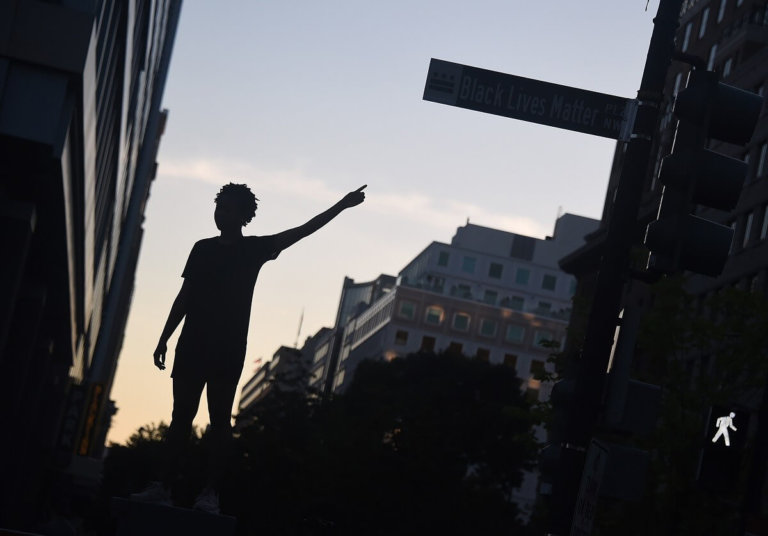
As an international student in the US, it is a prime time to learn about race in the US.
The nation has been taken over by Black Lives Matter protests; chances are there is one in your city, too. Reports and updates are flooding the news and social media feeds.
While you’re probably familiar with the movement, there is a lot to cover when discussing the African-American experience. If you’re not sure how or where to start, here are three simple suggestions you can start today.
Read, watch, share
Since it can be exhausting and upsetting for your black friends to talk about race all the time, take the initiative to seek out stories and experiences through new books, movies, and documentaries.

A demonstrator wears a face mask with the logo of the New Black Panther Party during a protest at Lafayette Square near the White House, against police brutality and racism, on June 7, 2020 in Washington, DC. Source: Jose Luis Magana/AFP
Black bookstore owners in the US are running out of popular titles tackling race in the US. Popular titles are even selling out on Amazon as more Americans seek to better understand the situation.
Bookstore owners are now recommending alternatives instead. They range from books that discuss history (“An African American and Latinx History of the United States” by Paul Ortiz) to racial bias in policing (“Chokehold: Policing Black Men” by Paul Butler). They can be catered towards young adults (“This Book is Anti-Racist: 20 Lessons on How to Wake Up, Take Action, and Do the Work” by Tiffany Jewell) or poetry lovers (“Brown Girl Dreaming” by Jacqueline Woodson).
If you’re a visual learner, documentaries like “13th,” “When They See Us,” “Strong Island,” and “Teach Us All” are available on Netflix. So are numerous movies showcasing the complexities of race in the US, including “Mudbound,” “See You Yesterday,” and “The Butler”.
Embrace and engage in conversations about race in the US
Rest in Power, Beautiful. @BlkLivesMatter honors those we have lost to police violence. #BlackLivesMatter #JusticeforGeorgeFloyd pic.twitter.com/AtqA0YtEOK
— Black Lives Matter (@Blklivesmatter) May 29, 2020
With the Black Lives Matter protests happening across the nation, there’s a lot of pressure to show your support. Those who can’t physically protest have been doing it online with hashtags and posts.
While it’s great to make your voice heard, it’s even better to channel them towards impactful actions.
As a student, you may not be able to donate to activist groups. However, being in university opens up numerous avenues for everyday conversations and action.
Listen when people of colour highlight systemic racism. Ask your sociology or political science professor questions about race in the US. Engage your black friends about their unique experiences and emotions. Volunteer your time or skills to help local black-owned businesses and charity organisations.
If you feel unprepared for these conversations, start by listening. Podcasts and TED Talks are a great place to start. Check out NPR’s “In Black America,” “Code Switch” and “Throughline”. “Still Processing” and “The Nod” are recommended for more relatable, current conversations.
Follow the right people

Filmmaker Ava DuVernay and musician Janelle Monae are among influential individuals you could follow. Source: Rich Polk/Getty Images North America/Getty Images via AFP
One simple way to educate yourself on race in the US is by using the tool you already know best: social media.
Follow black activists, artists, and writers on Twitter and Instagram. Read what they have to say about race politics and social justice reform. Then, amplify their voices in your circle.
When you find a particular piece that speaks to you, share it on social media or in conversations. That way, more people can benefit from your learning.
If you’re an international student from a different culture, take this opportunity to start conversations about race with your family and friends back home.
Finally, do not be afraid to let new-found knowledge challenge or change your opinions and actions.
Liked this? Then you’ll love…
The problem with race-based scholarships
How US universities are planning to reopen in fall







